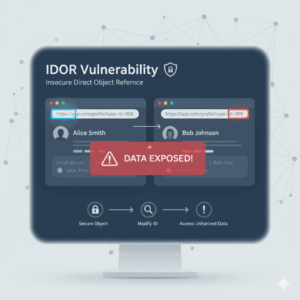Introduction : Cyber Extortion
Cyber extortion is becoming increasingly prevalent. With the rise of ransomware attacks, data breaches, and malicious online actors, individuals and organizations are finding themselves at risk of cyber extortion. But what exactly is cyber extortion, and what can you do to protect yourself or respond if you fall victim to it? This post aims to provide you with valuable insights and practical tips to help you better navigate this growing threat.

What is Cyber Extortion?
Cyber extortion is a criminal act in which a hacker or malicious actor threatens to harm an individual or organization unless a ransom is paid. This harm can take various forms, including the exposure of sensitive data, denial of access to critical systems, or the introduction of malicious software, such as ransomware. Cyber extortionists typically use threats to cause financial damage or reputational harm to their victims.
In recent years, cyber extortion has evolved, with threats extending beyond traditional ransomware attacks to include extortion through social engineering, data leaks, and even the threat of DDoS attacks aimed at overwhelming online services.
How Does Cyber Extortion Work?
- Ransomware Attacks: A common method of cyber extortion is through ransomware. The attacker infects the victim’s computer or network with malicious software, encrypting files or locking access to important systems. The victim is then demanded to pay a ransom, usually in cryptocurrency, to unlock their files or systems.
- Data Breaches: Cyber extortion can also occur when attackers gain unauthorized access to personal, financial, or proprietary data. The attacker may threaten to release the data publicly unless the victim complies with their demands.
- DDoS (Distributed Denial of Service) Attacks: Attackers may launch DDoS attacks, overwhelming an organization’s online services with traffic to cause disruption. They then demand a ransom to stop the attack, threatening to continue unless payment is made.
- Social Engineering: Cyber extortion can involve manipulation or deceit. Attackers may impersonate legitimate figures or create fake scenarios to extort money from individuals or businesses.
Cyber Extortion Involving Sensitive Images: What to Do
One of the most devastating forms of cyber extortion targets individuals with private, compromising images or videos. Cybercriminals may threaten to release or sell these images unless a ransom is paid. This can be especially harmful if the images are intimate, such as sexual photos, which can cause significant personal and professional damage.
If you are a victim of extortion involving sensitive images, here are some practical steps to follow:
- Do Not Engage with the Extortionist: Responding or paying the ransom will not guarantee the removal of your images, and it may encourage the attacker to target you again. Instead, focus on removing the images from the internet.
- Seek Professional Help: If your sensitive images are being shared online and you can’t remove them, we’re here to help. Our team can track down the sources and work to have the content removed from websites and platforms. Use the form below to get confidential assistance.
- Contact the Platform Hosting the Content: If the images are on social media platforms, adult sites, or other online services, immediately report the content for removal. Most platforms have dedicated processes for removing non-consensual intimate images.
- Legal Action: In many countries, it is illegal to share intimate images without consent, and there are specific laws in place to protect victims of “revenge porn” or similar offenses. Consider reporting the extortion to the police and working with a lawyer who specializes in cybercrimes.
Practical Tips to Prevent Cyber Extortion
While it’s impossible to guarantee that you’ll never fall victim to cyber extortion, there are several steps you can take to reduce the risk:
- Regularly Backup Your Data: Ensure you have regular backups of all your important files. Store backups in a separate location or in the cloud to avoid losing critical data if you are hit by ransomware.
- Update Software and Systems: Keep your operating system, antivirus software, and other applications updated to ensure you have the latest security patches. Cyber extortionists often exploit vulnerabilities in outdated systems.
- Use Strong, Unique Passwords: Implement strong password policies and avoid reusing passwords across different accounts. Consider using a password manager to store complex passwords securely.
- Enable Multi-Factor Authentication (MFA): MFA adds an extra layer of security to your online accounts, making it harder for attackers to gain unauthorized access.
- Educate Yourself and Your Team: Human error is a major factor in cyber extortion. Ensure you and your team are trained in identifying phishing attempts, suspicious links, and other common social engineering tactics used by cybercriminals.
- Secure Your Network: Use firewalls, VPNs, and encryption to protect your network from unauthorized access. Regularly monitor your network for unusual activity that could indicate an impending attack.
What to Do If You’re a Victim of Cyber Extortion?
If you fall victim to cyber extortion, it’s crucial to remain calm and take immediate action. Here are the steps you should follow:
- Do Not Pay the Ransom Immediately: While it may be tempting to pay the ransom to regain access to your data or systems, doing so may encourage the attacker to target you again or others. There’s no guarantee that paying will restore your files.
- Contact Authorities: Cyber extortion is a criminal act. Report the incident to law enforcement agencies, such as the local police or national cybersecurity authorities. They may be able to track down the perpetrators and help mitigate the damage.
- Talk to Our Cybersecurity Experts: Facing a cyber extortion threat? We can help. Our team specializes in removing malware, recovering data, and securing your systems. Contact us through the form below for fast, confidential support.
- Notify Affected Parties: If personal or financial data has been compromised, notify the affected individuals or organizations as required by law. This helps mitigate potential harm to those impacted by the breach.
Conclusion
Cyber extortion is a growing threat that can have devastating consequences. By understanding how these attacks work and taking proactive measures to protect yourself, you can reduce the risk of falling victim to this type of crime. If you do find yourself targeted, it’s important to act quickly and involve professionals to help mitigate the damage. Staying informed and prepared is the best defense against cyber extortion.
Contact Us for Help with Cyber Extortion Cases
If you or someone you know is currently facing a situation involving cyber extortion—whether it’s ransomware, the threat of exposing sensitive images, or another form of online blackmail—we’re here to help.
📝 Contact us through our forms: ransomware attacks, sensitive image removal, or other cyber extortion cases.





